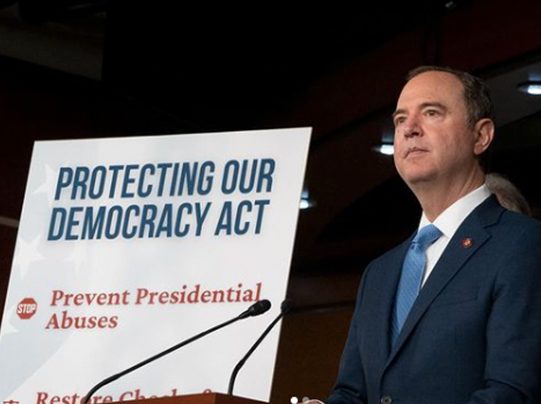
Rep. Adam Schiff and former professional baseball player Steve Garvey advanced in the primary for the special Senate election in California on March 5.
Garvey, a Republican, and Democrats Schiff, Rep. Katie Porter and Rep. Barbara Lee contested the seat formerly held by Dianne Feinstein, who died in office in September 2023. Under California’s nonpartisan blanket primary system, the top two finishers in the primary, regardless of party affiliation, advance to the general election.
As of March 15, Garvey had won 33.5% of the votes cast, Schiff 29.6%, Porter in third at 17.1% and Lee in fourth with 11.3%. While Schiff trailed Garvey by more than a quarter of a million votes, California’s status as a solidly-blue state means that Schiff is widely expected to win in the special election, as votes for the other Democratic candidates, such as the progressive Lee, will most likely coalesce around Schiff. If Schiff wins November’s election, California will not be represented by a female senator for the first time since 1992.
Civil Discourse Club member Timothy Deng (10) noted the reasons behind Schiff’s victory over the other Democratic candidates and the primary’s implications for the Senate election in November.
“One of his big selling points was ‘tough on Trump,’” Timothy said. “Schiff also ran campaign ads highlighting Garvey to push him into second. Incidentally, I believe he got an endorsement from Speaker Pelosi as well. So against Garvey, Schiff is almost guaranteed to win the Senate seat.”
Following projections by major news networks that Garvey and Schiff would advance, Porter conceded the primary but also claimed that “an onslaught of billionaires spen[t] millions to rig this election.” Her comments immediately drew backlash from other Democrats, including California Sen. Alex Padilla and Schiff himself. Timothy explained that Porter’s anti-corporate political action committee stances played a factor in her blaming Schiff’s donors for her loss.
“Katie Porter is extremely anti-establishment and against corporate interests. Throughout the race, she [accused] Schiff about being soft on that sort of thing and accepting large sums from those big donors,” Timothy said. “While his strategy might not be ‘moral’ strictly, it’s entirely within the realm of what is allowed, so there’s no justification to say the election was rigged, and it’s rather hypocritical coming from the progressive camp given how vocal they have been criticizing Trump. Although it was a definite faux pas on her part, I do think the outcry was excessively censorious.”
On the same day, President Joe Biden and former president Donald Trump dominated each of their parties’ Super Tuesday presidential primaries, held in 16 states and one territory. Biden won every state but lost to entrepreneur Jason Palmer in American Samoa, while Trump also won all the states except for Vermont, where former South Carolina Gov. and U.S. ambassador to the United Nations Nikki Haley edged out Trump in an upset victory, becoming the first woman to win a state presidential primary.
Haley dropped out of the Republican primary but did not endorse Trump, instead challenging the former president to earn the votes of her supporters despite a pledge to the Republican National Committee she signed that she would back the eventuall Republican nominee. During her campaign, Haley heavily criticized Trump for his policies and his age, whom she often compared to Biden.
Trump became the presumptive Republican nominee, and both he and Biden officially won the majority of delegates they needed on Tuesday, setting up the first presidential election rematch since 1956. Advanced Placement United States Government and Politics student Katherine Fields (12) believes that Trump’s overwhelming victories suggest the Republican Party has made a fundamental shift in its identity and base.
“The Republican party is now Trump’s party,” Katherine said. “Nikki Haley was the traditional conservative Republican candidate that we would have seen in the past years, but that’s obviously not what a majority of Republicans really want anymore. Trump has just amassed so much of a following and so much support that he’s basically the incumbent within his own party.”
Following Haley’s announcement, Biden welcomed Haley’s supporters and stated that they had a place in his campaign. History teacher Jonathan Rim agreed that Trump had become the main figure for the Republican party in recent years, but warned that those faithful to Haley could draw votes away from him in the presidential election, especially in certain swing states that could decide the outcome of the race.
“I was surprised at a certain exit poll that said a majority [of Haley voters] would not vote for Trump, so if they vote for Biden or don’t vote at all, they could harm Trump in November,” Rim said. “[The presidential election] is going to come down to these five or six battleground states that could make a difference, and it’s gonna be really tight.”
Rim also speculated that Haley’s careful choice of words in her suspension speech could be an indication of her future political ambitions, such as another presidential primary campaign in four years’ time.
“I definitely think she could be preparing for a run in 2028,” Rim said. “By not endorsing Trump, Haley’s positioning herself. She’s caught in a tough place because she doesn’t want to upset the Trump base of voters for potentially the next presidential election, but at the same time she doesn’t want to upset the more old school Republicans with those traditional conservative values.”


















![“[Building nerf blasters] became this outlet of creativity for me that hasn't been matched by anything else. The process [of] making a build complete to your desire is such a painstakingly difficult process, but I've had to learn from [the skills needed from] soldering to proper painting. There's so many different options for everything, if you think about it, it exists. The best part is [that] if it doesn't exist, you can build it yourself," Ishaan Parate said.](https://harkeraquila.com/wp-content/uploads/2022/08/DSC_8149-900x604.jpg)




![“When I came into high school, I was ready to be a follower. But DECA was a game changer for me. It helped me overcome my fear of public speaking, and it's played such a major role in who I've become today. To be able to successfully lead a chapter of 150 students, an officer team and be one of the upperclassmen I once really admired is something I'm [really] proud of,” Anvitha Tummala ('21) said.](https://harkeraquila.com/wp-content/uploads/2021/07/Screen-Shot-2021-07-25-at-9.50.05-AM-900x594.png)







![“I think getting up in the morning and having a sense of purpose [is exciting]. I think without a certain amount of drive, life is kind of obsolete and mundane, and I think having that every single day is what makes each day unique and kind of makes life exciting,” Neymika Jain (12) said.](https://harkeraquila.com/wp-content/uploads/2017/06/Screen-Shot-2017-06-03-at-4.54.16-PM.png)








![“My slogan is ‘slow feet, don’t eat, and I’m hungry.’ You need to run fast to get where you are–you aren't going to get those championships if you aren't fast,” Angel Cervantes (12) said. “I want to do well in school on my tests and in track and win championships for my team. I live by that, [and] I can do that anywhere: in the classroom or on the field.”](https://harkeraquila.com/wp-content/uploads/2018/06/DSC5146-900x601.jpg)
![“[Volleyball has] taught me how to fall correctly, and another thing it taught is that you don’t have to be the best at something to be good at it. If you just hit the ball in a smart way, then it still scores points and you’re good at it. You could be a background player and still make a much bigger impact on the team than you would think,” Anya Gert (’20) said.](https://harkeraquila.com/wp-content/uploads/2020/06/AnnaGert_JinTuan_HoHPhotoEdited-600x900.jpeg)

![“I'm not nearly there yet, but [my confidence has] definitely been getting better since I was pretty shy and timid coming into Harker my freshman year. I know that there's a lot of people that are really confident in what they do, and I really admire them. Everyone's so driven and that has really pushed me to kind of try to find my own place in high school and be more confident,” Alyssa Huang (’20) said.](https://harkeraquila.com/wp-content/uploads/2020/06/AlyssaHuang_EmilyChen_HoHPhoto-900x749.jpeg)















